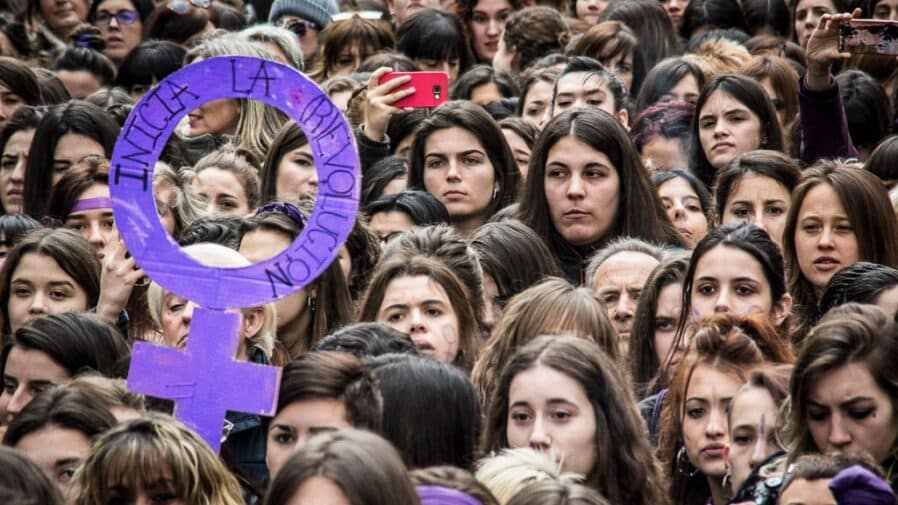

WARS ARE raging across the world. Everywhere civic infrastructure is targeted; people are told to evacuate; meditation, sanitation, clothing, shelter, even food and water become scarce commodities.
Women, many separated from their own partners, parents or children, are expected to keep families and communities together, while being targeted by invading soldiers for abuse, rape or even murder.
To them this International Working Women’s Day, we should commit ourselves ever greater to the struggle for peace, justice and women’s liberation.
In Sudan, a year-long brutal civil war is being fought out on the streets of the capital Khartoum and across the country.
Both sides—the Sudanese Armed Forces, which grabbed power in a military coup in October 2022, and the Rapid Support Forces, formerly known as the Janjaweed, a notorious genocidal militia—have attacked civilians.
Both sides detest the forces of the Sudanese revolution of 2018-19, which was led by women, like Alaa Salah. Recognising the leading role of women in the democracy movement, the RSF in particular have resorted to rape as a military tactic, with over 4,400 cases estimated by NGOs. Despite this, women remain in the forefront of the struggle for democracy against the warlords.
In Ukraine Russia’s invasion two years ago led to nearly 10 million refugees being internally displaced or leaving the country. Overwhelmingly these were women and children, who had to leave their jobs, schools and support networks and remake their lives from scratch and only with what they could carry. 40,000 women chose to fight in the army to repel the imperialist invasion, with 8,000 taking officer positions and 5,000 operating in the trenches on the frontline in indescribable conditions.
There are many examples of women soldiers having to battle against the sexism of male soldiers. Now they must use their hard won respect to fight for rank and file soldiers’ right to debate and influence the course of the war, in particular what kind of society Ukraine should be at the end of the war and the need to remain independent of both Russia and the West if Ukraine is to be truly free.
Gaza
According to the UN, 70% of the nearly 30,000 killed are women and children. Nearly a million women and girls have been displaced.
On 21 February the UN condemned Israel’s ‘near total disruption of schooling, massive destruction of housing, lack of access to sexual and reproductive health care and supplies, and heightened risk of arbitrary detention and violence, including gender-based violence, faced by women and girls in Gaza and the West Bank’.
Israel’s supporters and some Western feminists like to contrast Hamas’ restrictions of women’s roles to the family, control of their dress and sexuality, with Israel’s surface liberalism, pointing to the mass conscription regardless of gender into the IDF as a symbol of equality. Their arguments are one-sided and false on both accounts.
Enrolling young women into the racist, Jewish-chauvinist armed forces in order to occupy the remaining Palestinian territories is hardly liberating women from their oppression. Israel remains not only a thoroughly racist, but deeply sexist society. The young women in the IDF are a product and expression of the oppression of others, not of their own ‘liberation’.
In fact, the rising role of religion in Palestinian society is a product of the repression by Israel of the more secular forces which led the PLO in the twentieth century and then, after the Oslo Agreements, the latter’s compromises with Israel in policing the West Bank. Islamists like Hamas stepped in to lead resistance, building out from their social aid institutions.
Once Palestinian women start to organise for their own survival, they necessarily come up against and challenge men’s sexist attitudes and behaviours. Israeli women who want to fight for their own liberation need to raise their banners on the anti-war demonstrations in Tel Aviv and elsewhere, linking their struggle to the liberation of Palestine.
In the First World War, Sylvia Pankhurst broke with the bourgeois feminist movement, which supported the imperialist bloodbath. Today a working class, internationalist women’s liberation movement will have to define itself in relation to the struggle for human liberation in the harsh conditions of imperialist rivalry and national liberation movements.
The old slogan, ‘No socialism without women’s liberation, no women’s liberation without socialism!’ needs to be raised again today in Palestine, Sudan and Ukraine—and in Israel and Russia—both in the fight against imperialist-led slaughter and in the struggle for a better society—socialism.